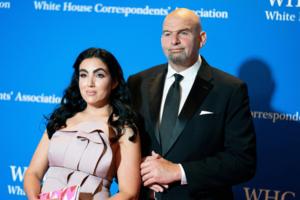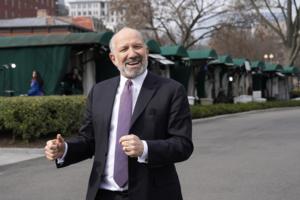Current News
/ArcaMax

California governor candidates react to Kamala Harris not running: 'Mission hasn't changed'
SACRAMENTO, Calif. — Democratic candidates for California governor likely breathed sighs of relief Wednesday when former vice president Kamala Harris announced she would not enter the race next year.
After weighing the decision for much of the year, Harris said she plans to focus on “listening to the American people (and) helping elect ...Read more

Sen. John Fetterman to release memoir in November
WASHINGTON — U.S. Sen. John Fetterman, the Braddock Democrat whose independent streak and grapples with health issues have made headlines since before he came to Washington, will release a memoir in November.
The "candid" memoir, titled "Unfettered," will share the story of Mr. Fetterman's rise from AmeriCorps and business into politics, ...Read more

Three reasons why the Pacific Ocean tsunami fizzled before reaching Washington
SEATTLE — The earthquake Tuesday off Russia’s far eastern coast was one of the strongest in recorded history. People across the Pacific Ocean braced for a potentially devastating tsunami to follow.
Some damage and flooding were seen in the nearby and sparsely populated areas. But across much of the ocean, including along the Washington ...Read more

US made trade deals with Thailand and Cambodia, Lutnick says
Commerce Secretary Howard Lutnick said the U.S. had reached trade agreements with Cambodia and Thailand, days after the Southeast Asian neighbors agreed to a ceasefire at President Donald Trump’s urging after deadly clashes along their disputed border.
“And you know what we did today? We made trade deals with Cambodia and Thailand,” ...Read more

Trump, Mexico's Sheinbaum plan call as tariff deadline nears
WASHINGTON — President Donald Trump and his Mexican counterpart Claudia Sheinbaum plan to speak by phone on Thursday morning, according to people familiar with the plans, as a Friday deadline to avoid a 30% tariff nears with no agreement between the U.S. and its largest trade partner.
Talks between the governments, which saw Mexican Economy ...Read more

California high-speed rail has a plan to build to Gilroy, Palmdale simultaneously with Central Valley segment
As costs ballooned and political backlash mounted, the California High-Speed Rail Authority pivoted years ago to building its 400-mile bullet train between San Francisco and Los Angeles in segments — starting with a 171-mile stretch connecting the agricultural cities of Merced and Bakersfield.
Connections to the major population centers in ...Read more

Alec Baldwin's lawsuit against New Mexico officials dismissed
A New Mexico judge has dismissed Alec Baldwin’s lawsuit alleging that he was maliciously prosecuted — one year after the actor-producer was cleared of a criminal charge in the “Rust” shooting death of the film’s cinematographer.
Baldwin alleged in a January lawsuit that he was the victim of overzealous New Mexico prosecutors and law ...Read more

Trump yanks millions of acres of ocean designated for wind power
WASHINGTON — The Trump administration is revoking approval for millions of acres of ocean to be set aside for offshore wind development amid an escalating attack on the renewable power source.
The Interior Department’s Bureau of Ocean Energy Management announced Wednesday it was rescinding huge swaths of ocean in the U.S. Outer Continental ...Read more

Why one of the biggest earthquakes ever recorded caused so little damage
SAN FRANCISCO — It was one of the largest earthquakes ever recorded, a magnitude 8.8 monster off the eastern coast of Russia.
Despite its remote location, the size of the quake immediately brought potential danger of tsunami to a significant swath of the globe, including Japan, Canada and the United States. Tsunami alerts immediately went ...Read more

After outcry, LA restricts duplexes in Pacific Palisades
LOS ANGELES — As rebuilding ramps up in Pacific Palisades, Los Angeles leaders are restricting the building of duplexes on single-family-home lots.
The move follows an executive order issued Wednesday by Gov. Gavin Newsom that allows exemptions for the Palisades and other areas devastated by January’s Palisades and Eaton fires from Senate ...Read more

Trump tax cut law blows $1.1B 'hole' in Michigan budget, new report warns
A new $1 billion financial hit, spurred by a tax law signed by President Donald Trump, is poised to complicate Michigan lawmakers' mission of crafting a state budget and avoiding a government shutdown, suggests a new report from a nonpartisan research group.
The 13-page analysis from the Citizens Research Council of Michigan, released Wednesday...Read more
Senate confirms former Washington congressional candidate Joe Kent to counterterrorism post
The U.S. Senate has confirmed former Washington congressional candidate Joe Kent as director of the National Counterterrorism Center.
In a 52-44 vote Wednesday, Senate Republicans pushed through Kent's nomination to be the top counterterrorism official within the U.S. intelligence community, brushing off objections from Democrats over his ...Read more
Evacuations ordered as fire grows in Olympic National Park
The Mason County sheriff’s office ordered people near Olympic National Park to evacuate as the Bear Gulch fire grows.
The human-caused fire was first reported early this month near the park and has since grown to cover 2 square miles on the northern shores of Lake Cushman. It is less than 10% contained.
Anyone near the Dry Creek Trail, along...Read more

Moonbound Artemis II astronauts stay focused despite NASA uncertainty
CAPE CANAVERAL, Fla. — It could be less than nine months before humanity ventures back to the moon, even if only to fly around it. The people set to make that flight were back on the Space Coast on Wednesday to log time with their ride, the Orion spacecraft.
First up, the crew of Artemis II with NASA astronauts Reid Wiseman, Victor Glover and...Read more
Richard Tillman now faces federal arson charge for San Jose post office attack
SAN JOSE, Calif. — A man charged locally with trying to destroy a South San Jose post office by driving a flaming car into the building — while livestreaming the entire ordeal, including his real-time police interrogation — now faces a federal arson charge for the alleged attack, according to the regional U.S. attorney’s office.
Richard...Read more

Trump eyes his Doral club in Florida for G20 summit
WASHINGTON — President Donald Trump plans to host next year’s Group of 20 summit at his Doral resort in Florida, and to cut the number of extra participants to narrow the gathering’s size, people familiar with the matter said.
Preliminary planning is underway with the United States set to take over as host country in 2026. No final ...Read more

Colorado lawmakers must close new budget gap -- reaching nearly $1 billion -- caused by Trump tax bill
Colorado lawmakers must immediately cut or find nearly $1 billion to fill a massive hole blown in the budget by the federal tax bill signed by President Donald Trump, state officials told legislative leadership Wednesday.
“It is significant, and every day we wait, the deeper the cuts we will have to make as we go through this,” said Mark ...Read more

Anti-DEI group's complaint against Duke in sync with Trump administration threats
When the Trump Administration accused Duke University of racist practices and threatened to pull federal funding this week, no specific allegations were made public.
Federal officials only said that “allegations have been brought” to their attention that, if credible, could “render Duke Health unfit for any further financial relationship ...Read more

Funeral for NYPD Officer Didarul Islam slain in Park Avenue mass shooting set for Thursday
Last week, NYPD Officer Didarul Islam thought he knew exactly where he and his family would be the following Wednesday: enjoying themselves at a New Jersey water park.
But instead of experiencing the fun-filled day with extended family members Islam’s two sons were so looking forward to, the family is planning the hero cop’s funeral.
“...Read more

Donor pulls $10 million gift to Miami Dade College over in-state tuition waivers
MIAMI — Weeks after rescinding a $1 million donation to Florida International University, Miami philanthropist Miguel “Mike” Fernandez is now withdrawing another $10 million from Miami Dade College — a direct response to Florida’s recent repeal of in-state tuition for undocumented students.
In a letter dated July 29 to MDC President ...Read more
Popular Stories
- Aland Etienne, lobby security guard in Park Avenue mass shooting, died trying to stop elevators, NYPD says
- Park Avenue gunman Shane Tamura left second suicide note in Las Vegas home
- Who is Kim Yo Jong, sister and 'right hand' of North Korean leader Kim Jong Un?
- 6 still hospitalized after Walmart stabbings, but 5 in good condition
- Pandemic aged our brains faster, whether or not we got COVID, study says





